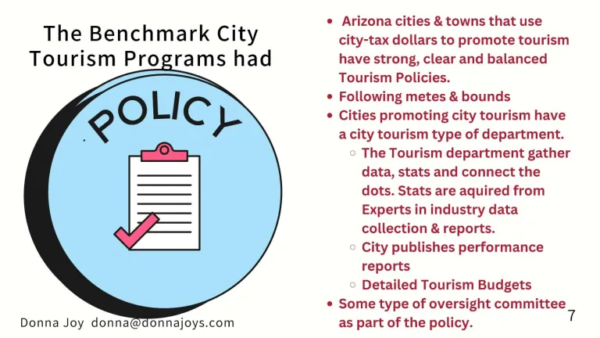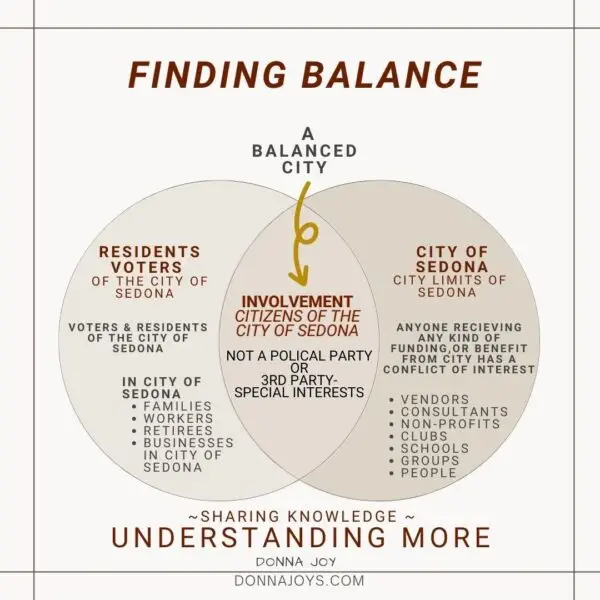What City “DMO” Status Means For Business and Residents
By Brian Fultz, Kathy Kinsella, Holli Ploog, the City Council Tourism Work Group
was submitted for publication.
What City “DMO” Status Means For Business and Residents
By Brian Fultz, Kathy Kinsella, Holli Ploog,
the City Council Tourism Work Group
Residents and business owners may have read that the City of Sedona recently
appointed itself as Sedona’s official “DMO.” The DMO acronym stands for Destination
Marketing Organization. That designation now puts the city in charge of its own tourism
marketing and management, and will replace a service contract with the Sedona
Chamber of Commerce to function as the City’s Tourism Bureau (SCC&TB).
The City’s action came after the SCC&TB provided written notice of its intent to not
renew the service contract between the City and the SCC&TB for the provision of visitor
services for fiscal year 2024. The Arizona Office of Tourism (AOT) recognizes only one
(DMO) per community and requires that in order to coordinate tourism promotion with
AOT, a DMO must be designated via official action by the government entity
representing that community. Decisions around tourism issues will now be made directly
by the city with the input of those who live and work in our community. The City intends
to seek advice from a broad cross section of residents, businesses and partners as our
tourism program develops.
In the absence of a service contract the city will now forge a new path in conducting
Sedona’s destination marketing and tourism management. It is now up to Sedona to
develop a new program.
Other Cities that are their own DMOs include Cottonwood, Williams, Prescott, Flagstaff
and Show Low. At its April 12 meeting, the Sedona City Council directed staff to hire a
consultant to assist with the process of bringing tourism management in-house, and to
bring recommendations back to Council for its consideration.
The bed taxes collected by businesses within the city will support those very businesses.
Public money will not be used to discriminate against in-city businesses that are not
Chamber members or be improperly used outside our city limits. Bed tax money cannot
be restricted to the use of a members’ only organization. Those conflicts have now been
removed.
Using public tax dollars for our community puts the City in a better position to partner
with neighboring official DMOs in the Verde Valley. A regional approach is key to our
success as we represent Sedona businesses to ensure our economic health.
Under state law definitions, bed taxes are to be used for:
- direct expenditures by the city or town to promote tourism, including but not
limited to sporting events or cultural exhibits - contracts between the city or town and nonprofit organizations or associations for
the promotion of tourism by the non profit association or organization - expenditures by the city or town to develop, improve, or operate tourism related
attractions or facilities or to assist in the planning or promotion of such attractions
or facilities.
Sedona spends bed tax dollars collected to support tourism in our city. The city more
than meets legal spending requirements and it supports business and tourism with these
public funds. Some examples are:
We continue to invest in a trailhead shuttle program to better access trailheads
while removing parking conflicts, reducing traffic, and reducing the emissions
related to that traffic. The city provides parking lots to make sure that visitors can
access the shuttles without bringing additional congestion into neighborhoods.
The city pays a portion of the operations of the Verde Shuttle, which provides
connectivity between Sedona and Cottonwood, thereby supporting the
movement of our tourism workforce.
An important attraction to our area is Sedona itself: the great outdoors. The City
supports maintenance and enhancement of our area trails with direct financial
contributions to the Trail Keepers fund and to the US Forest Service and by
being a member of the Leave No Trace collaboration.
The City provides recreation amenities like a bike skills park and a disc golf
course that people specifically come here to enjoy. Sedona’s recreation and
entertainment programs, which serve residents and visitors alike, include a
concert venue, free entertainment including movies in the park and recreation
events, and even our famous St. Patrick’s Parade.
Investment in public amenities like the SR179 pedestrian underpass that will
provide creek access and public art.
Now the City will be looking at what additional programs and initiatives will serve our city.
This is a new era.
A healthy economy for our city depends on supporting businesses in our city. Business
is the economic engine of Sedona and taxes collected support many of the services that
our city provides, from road maintenance and parks, to programs to develop workforce
housing, our grants programs for non profit service organizations, and so much more.
Educating our visitors both before and during their time in Sedona is critical. Educating
our businesses as to how they can serve residents and visitors in a way that sustains
their business throughout the year is also key. Educating residents as to how they can
help support local business and partner with them is equally important. Collaboration is
critical for success.
The City is the best entity to serve as our DMO. We already represent the community as
a whole, including residents, businesses, and our visitors. Together, residents,
businesses, tourists, and government make Sedona what it is.
#
Learn more about Sedona Community Issues and join in community conversations
Facebook Groups:
Sedona Politics in Motion
Greater Sedona ~ Quality of Life
Sedona Open Bulletin Board
Read more on News | Events
Performance Management City of Glendale, Arizona
Learn more about the Department of Organizational Performance City of Glendale, Arizona and how using science, technology, engineering, and mathematics
Continue Reading Performance Management City of Glendale, Arizona
Arizona Cities that use “What Works Cities”
What Works Cities for Local governments? Quality management programs, that improve and engage residents through data-driven analysis
Continue Reading Arizona Cities that use “What Works Cities”
Is asking the city for performance metrics unreasonable?
City performance metrics programs work beyond the elected officials two- or four-year term continuously improving the process
Continue Reading Is asking the city for performance metrics unreasonable?
Understand More Arizona’s Complex Tourism Policy
Understand More About Arizona’s Complex Tourism Policy, see how other cities align with it, and learn how it took Sedona over 20 years to get a fair and balanced policy.
Continue Reading Understand More Arizona’s Complex Tourism Policy
Great Public Policy Creates Engagement Programs
Citizen Engagement Programs are positive moving a community forward. Creating improvements and making a location a better place to live.
Continue Reading Great Public Policy Creates Engagement Programs
Learn more about the Expenditure AZ law
Expenditure limitation is regulated by the State of Arizona. There is two (2) Types of Alternative Expenditure Limit for Cities and Towns in Arizona. These alternative…




